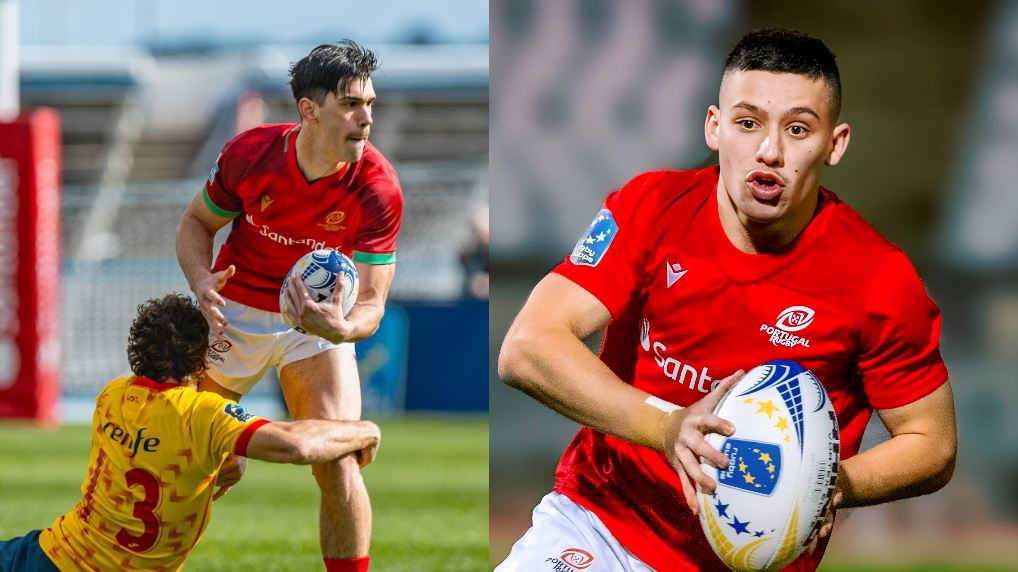Rugby Europe Championship: Hugos bossing it for Portugal

Portugal went into the 2024 Rugby Europe Championship on the crest of a wave having won their first game at a Rugby World Cup only a few months before.
Os Lobos’ 24-23 victory against Fiji in their last match of the tournament was the perfect way for Patrice Lagisquet to bow out as head coach and also gave veterans like hooker Mike Tadjer and scrum-half Samuel Marques a winning send-off.
World Rugby high-performance consultant Daniel Hourcade then came in as interim head coach while Os Lobos selected a remodelled squad for the Rugby Europe Championship with the next four-year Rugby World Cup cycle in mind.
Several uncapped players were given a chance and among them, winger Lucas Martins – the brother of Nicolas Martins, one of Portugal’s standout performers in France, and the two half-backs, Hugo Camacho and Hugo Aubry, have stood out.
While Martins looks to be a natural finisher in the mould of Damian Penaud, or Os Lobos team-mate Raffaele Storti and has taken Test rugby by storm, the way that fellow rookies, Hugo Camacho and Hugo Aubry have adapted to this level is arguably even more impressive given they’ve been tasked with running the show at half-back.

Camacho and Aubry were both uncapped before Portugal kicked off the Rugby Europe Championship with a shock 10-6 defeat to Belgium, which was perhaps the wake-up call they needed after the euphoria of the Rugby World Cup, but look destined for long futures in the game.
Aubry turned 21 between the pool stages and the knockout phase, while Camacho is still a teenager and doesn’t turn 20 until May. Even if Portugal don’t become the first team to beat Georgia in the Rugby Europe Championship in seven years and win Sunday’s final, their emergence will be considered one of the major positives of the campaign.
As well as sharing the same Christian name, Camacho and Aubry are both French-born but with Portuguese ancestry. The scrum-half’s grandparents were immigrants from Madeira, while Aubry’s mother is from Portugal.
“They call us ‘Hugo Uno, Hugo Dos’,” laughs Aubry, who has won two Player of the Match awards in four appearances and is the competition’s leading points scorer.
“We’re lucky enough to have already played in the Espoir category. He played for Bayonne, and I played for La Rochelle, so we’re more or less the same generation; I’m just a year older than him.
“We get on really well, we speak French fluently, so when we’re playing together it’s a lot easier. We’re all part of the national team project and that’s good for us.”
Aubry has since moved from La Rochelle to Roeun and is the most reliable goal-kicker in the competition with a 90%-plus success rate.
Camacho, meanwhile, started his Test career off the bench against Belgium but scored a hat-trick against Poland – believed to be the first by a Portugal scrum-half – in his first start and has kept hold of the number nine jersey ever since.
A few months ago both were sat at home watching on TV as their heroes made the rugby world sit up and take notice, whereas now they are central to Portugal’s chance of toppling six-time defending champions Georgia.
Naturally, Camacho is excited to be playing in such a big game at the Stade Jean-Bouin, which is being televised by RugbyPass TV.
“It’s going to be exceptional. Two months ago, I never thought I’d be playing in a European Championship final, and in Paris against Georgia. That’s a huge plus,” said Camacho.
“For me, as a Frenchman by birth, it’s symbolic to be playing in a final in France. There will be family and friends there.”
Georgia are unbeaten in their last 32 Rugby Europe Championship matches, including a 38-11 win over Portugal in last year’s final, and Camacho and Aubry are under no illusions about the size of the task ahead of them.
Portugal last won a European title in 2003 and Georgia are not going to give up their status as the region’s best European team outside of the Six Nations lightly.
“It’s going to be a great match between the two teams,” said Aubry, who has to be content with a place on the bench, while Camacho is hoping his pack can give him a solid platform to play from. “Georgia are a tough team who are very solid and hard on the ball. I think we have better players in the backs, but we’re going to have to get past them first. The forwards are preparing for a big match.
For the players, Portugal must build on the legacy of the Rugby World Cup, which caused quite a stir back home with rugby knocking football off the back pages following the win over Fiji.
Portugal also drew 18-18 with Georgia and would have won the game had Nuno Sousa Guedes’ last-gasp penalty not gone wide of the upright.
“You can feel it. When we played the semi-final against Spain, there were a lot of people there, between 9,000 and 10,000. For Portuguese rugby, that’s impressive,” acknowledged Camacho.
“We’d already seen it in our first match in Belgium. When we lost, it was as if the Belgians were world champions. That means we’re starting to become a big team; already at European level, we’re starting to rank a bit higher and we’re going to have to show that the World Cup wasn’t just a matter of luck; it was done on purpose. The players are keeping a cool head, they know where they’re coming from.”
























